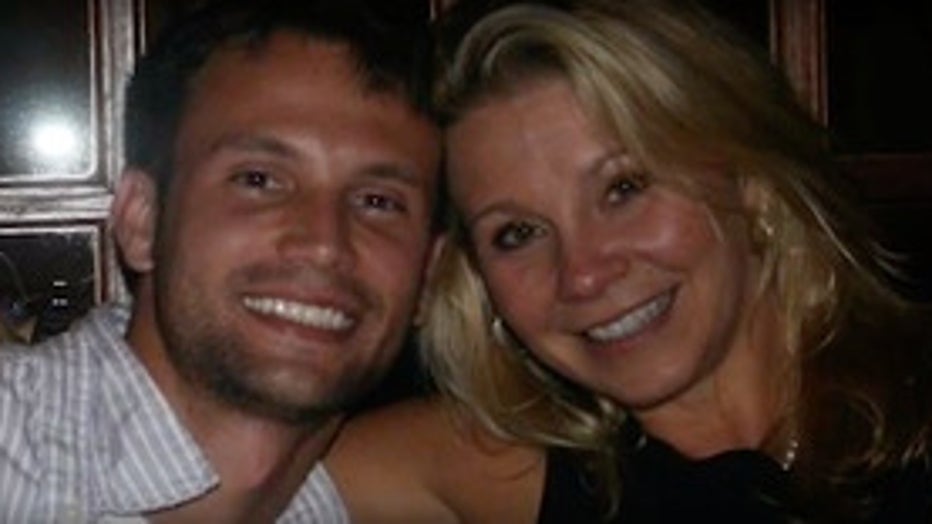Atlanta woman turns pain of loss into mission to help prevent opioid addiction

"He fought it over half of his life over 15 years. He fought it every day."
A mother told FOX 5 the hardest thing any parent could go through is burying their child. Her son, Christopher, died of a drug overdose after being prescribed a powerful painkiller 10 years prior. A program in Georgia works to make sure that same tragic fate cannot happen to future patients navigating pain treatment.
ATLANTA - Cammie Wolf Rice's Atlanta apartment is full of reminders of her oldest son Christopher.
"He was about helping other people," Wolf Rice says. "He wanted to be a Navy SEAL, super disciplined, book-smart."
Diagnosed as a teen with ulcerative colitis, Christopher had his first major surgery to remove a section of his intestines when he was senior in high school.
His mother says doctors sent him home with the powerful opioid painkiller OxyContin, 90 pills.
"Yeah, it was just a big, tall orange bottle full of big white pills," Wolf Rice remembers. "I didn't know to ask the doctors questions, and I gave them to him every 4 hours, because that's what I was told to do, and he was in pain and was not offered any alternatives to pain except those opioids. It hijacked his life and his brain."
There would be more surgeries and complications, and more pills.
But, she says, this was the early 2000s, and no one was talking about the risk of opioid addiction, at least not yet.
"He finally came to me," she says. "And, he said, 'Mom, I need help. It's not one pill that is doing it now. I need more. I need two. I need three."
Christopher, she says, would spend the next decade in and out of rehab.
"People are addicted to coffee," she says. "People are addicted to exercise. Whatever the addiction is, magnify that tenfold, and that's what it's like when you're addicted to an opioid. He fought it over half of his life over 15 years. He fought it every day."
In February 2016, on a family trip to Cambodia, Christopher Wolf died of a heroin overdose.
He was 32.
"I had to fly from Cambodia to Atlanta with my son underneath me in the plane, in a coffin," Wolf Rice says, her voice catching.
Since Christopher's death, she has written a book, "The Flight," about how losing her oldest child inspired her new mission to help patients more safely navigate pain treatment.
"I based it on every single thing that he did not have that he needed, and things that I need as a parent, as a caretaker," Wolf Rice says. "You know, you have to be informed."
Four years ago, she teamed up with Dr. Mara Schenker, chief of orthopedics at Grady Memorial Hospital in Atlanta, creating a pilot program to provide care coaches to Grady orthopedic trauma patients.
"In our society, we use coaches for everything: an executive coach, workout coach, sleeping coach," Wolf Rice explains. "But, yet, when you're in a health crisis, you have no coach to help you manage your pain, to discuss with you alternatives to taking opioids."

At Grady care coaches offer patients a personalized pain management plan, information on alternative therapies to reduce pain, and follow-up care once they have left the hospital.
Dr. Schenker, an orthopedic surgeon, says the care coaches can also screen patients for substance use disorders that may complicate their recovery.
"They can sit down with you, and they can spend time with you," Schenker says. "They can figure out, you know, your past history. Have you had a substance use history in the past? And, if so, what can we do to help you get through this? Because it does make it harder as you move forward to deal with pain after trauma."
Grady now has three care specialists funded by grants, working with orthopedic patients and those being treated for sickle cell disease, a painful blood disorder.
Until now, Dr. Schenker says, providers and patients often found themselves trying to negotiate how much pain medication was enough, with some patients insisting they needed additional pain medication.
"What they were really saying is, 'I need help managing my pain,'" Schenker says. "But, they didn't know how to say it in any other way, other than 'I need more pain pills.' And so it's changed drastically since the introduction of our life care specialist program. It's almost never a negotiation. Now we have a standard protocol. We walk patients through it, and then they leave the hospital and they wean off of it."
It's been almost seven years since they lost Christopher Wolf.
Cammie Wolf-Rice hopes their care coaches will save other families the pain of addiction.
"Nobody wants to be an addict," Wolf Rice says. "Nobody asked to be an addict. My son did not ask to be an addict.
It is my job while I'm on this earth to do what I'm doing, and I'm not stopping."

